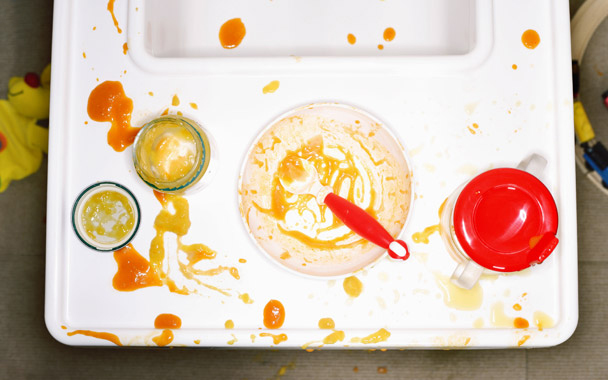I’m starting to think there are a whole bunch of scams going on regarding the feeding of babies. Parents of those babies who happily consume everything in sight, don’t you worry about this. Everything works for you guys. This is for the parents of those babies who turn up their noses at so many of your culinary overtures. Oh, is that most of you? I thought so.
The first scam is this purée business. And I mean big business—your supermarket has a whole aisle devoted to jars and jars of purée, and the predominant sentence in that huge section of baby cookbooks at your local bookstore is “Blend to desired thickness.” Interestingly, much of the faith placed in purées comes from our parents’ generation. While we were being raised, the recommendation was to start babies on solids at three months or sooner, which meant many months of being able to handle only soft, mushy foods. These days, pediatricians recommend starting after six months and acknowledge that some babies don’t really take off eating solids until eight or nine months. Purées, therefore, are hardly necessary: After spending a few weeks practicing with (read: rejecting) rice cereal, babies can move up to mashed table food—things like banana, avocado, cooked sweet potato—and bypass those jars and baby mills completely. It’s utterly revolutionary!
I asked author, nutritionist, and baby-feeding guru Ellyn Satter about it and she confirmed my suspicion. “When it’s time for solids, lots of parents start by reading the jars of baby food at the supermarket and being guided by what it says on the jars. And since the jars encourage them to use lots of little puréed fruits and vegetables, that tends to be what people do.” And the folks making their own baby food? “Some parents want to make baby food,” she said. “I’ve never been able to figure that one out myself. I don’t get a kick out of cooking a pan of vegetables for a baby and puréeing it and putting it in little ice cube trays. But some parents really want to do that, and that’s fine.”
Another idea I’ve seen repeated again and again is that babies’ palates are more sensitive, and thus, their food needn’t be seasoned to your own adult taste. Well, maybe it would be misguided to spike the rice cereal of a six-month old with cumin and pimenton, but I’ve found that the plain omelets and noodles, and the plain cooked vegetables I have made especially for Franklin, my 13-month-old, get nixed flat-out. The ones I make for myself, salted just enough, or sautéed with garlic and oil, are the ones he demolishes. My husband’s jaw is on the floor when he sees some of the things I feed our baby (“Should a baby be eating all that oily Swiss chard?” he has asked, especially after particularly hair-raising diaper-changes) but I won’t argue with the guy in the highchair, at least not while he’s happily eating vegetables.
Swiss chard? I never had to twist his arm to try it, because of my ace-in-the-hole, the one technique that has really worked: Eating together with the baby. Though I had heard as much was true with older children, Franklin taught me himself how well it works with babies: Many times he would turn down all the baby stuff I offered him, only to then watch me eat my own lunch with imploring eyes and a wide-open mouth. This can, of course, be a big problem—I’ve learned not to crunch on raw carrot in front of him until his molars come in. But this same child who has rejected baby standbys like sweet potato and applesauce will eagerly slurp my soba noodles, nibble my egg salad sandwich, scarf my mother’s Swiss chard and fava bean soup.
But not all the time. Maybe the most important myth to dispel is that this all happens in a linear fashion: Babies eat purées, then move up to mashed banana, then feed themselves their own buttered toast, until finally they are the ones personally carving the roast beef at the holiday table. The reality is more like your baby will be making some progress, and then, suddenly, will be thrown off her game by teething, an ear infection, or an evolving nap schedule—and you’re back to having a baby who wants barely more than milk, sometimes for weeks at a time. It’s unnerving; it makes you question your entire approach, and I’ll admit that long after Franklin had been merrily eating all sorts of table foods, one of these spells spurred me to buy a whole bunch of jars of purées to try to encourage him to eat. I shouldn’t have been surprised: He didn’t want those, either. When baby stops eating, all you can do is wait it out, with the faith that soon enough, you’ll be munching on a slice of pizza, and the drool forming on your baby’s chin will be the sort that doesn’t indicate teething.




 Pinterest
Pinterest


